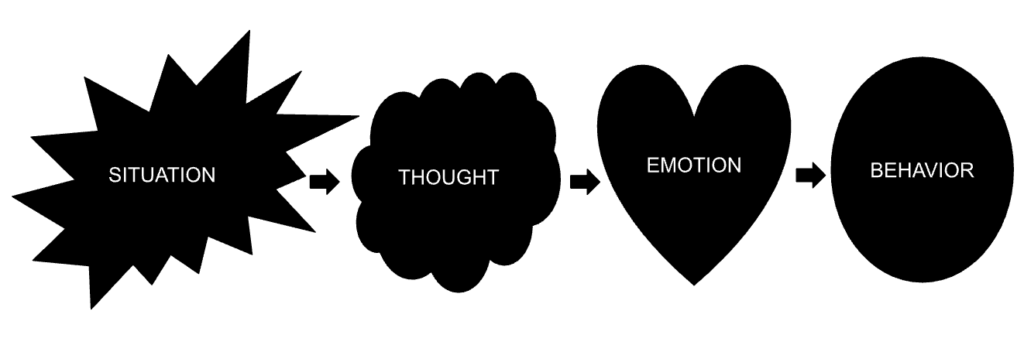
What are Cognitive Distortions?
Cognitive Distortions are ways of thinking that are irrational, untrue, and ultimately unhealthy to our well-being. They are negative thought patterns that affect our emotions, and our subsequent behaviors; they are very common in patients that suffer from depression and anxiety disorders.
How Cognitive Distortions affect us:
The cognitive model indicates that what we think and how we feel and how we behave are constantly interacting and influencing each other:

For any given situation, how we interpret and think about the situation determines how we feel about it, which then determines how we act. Let’s look at an example of how this model may play out for two individuals in the same situation:
One Situation, Two Thought Patterns:
Jack and Jill each get a poor grade on a math test.
Jack thinks to himself after receiving a poor grade on his test “I am so stupid. If I were so stupid, I would get a better grade on the test.” Jack’s resulting feelings may be emotions such as discouragement and pessimism about his future performance. Because he doesn’t have much self-esteem and believes that he is “too stupid to improve” he doesn’t change his behavior to behave more effectively for the next test.
Jill on the other hand receives a poor grade on her test but thinks “wow, that test was really hard. I really underestimated how tough it’s going to be. I need to change how I am going to study so that I can be more successful next time.” If she has these thoughts, her emotions may be initial disappointment but also feel more motivated and driven to study harder. Jill then changes her behavior so that she changes the way she studies, asks more questions during class to her teacher, and finally improves her scores on the next tests.
Jack’s way of thinking led to depression and anxiety about his future performance, while Jill’s way of thinking led to motivation and determination to do better on her next exam.
The link between irrational beliefs, our emotions, and our future behavior:
Our brains are constantly using thoughts to make interpretations about situations and events. Anytime we receive information from our five senses, we use our brain to make sense of the situation, to give us context, to tell us what it means. If our brains didn’t do that, we would be confused all the time – we would have so much input coming in and wouldn’t know how to make sense of it. However, part of making sense of it means making some assumptions of our surroundings
For example, we may see a stranger rushing towards us with a menacing look on our face. We may assume that we’re in danger. If we have that thought, then our emotion or feeling is going to be fear, and the behavior is doing something to escape or avoid that dangerous situation. This is essential to our survival, and this is an example of how our brain can work to protect us.
Sometimes, our assumptions can be wrong:
Sometimes, our assumptions can be wrong and can actually result in unhelpful, uncomfortable thoughts, emotions, and behaviors. People who suffer from depression or anxiety tend to have a higher number of unfounded negative thoughts which we call “irrational beliefs.” We call them irrational beliefs because they are unhelpful and untrue – they are not based in reality.
Another thing about our thoughts is that our thoughts can be automatic. These thoughts happen outside of our awareness, almost like a reflex. We call those ‘automatic thoughts’ because we are not aware of them. When a thought occurs automatically, we are not able to assess it for accuracy because we didn’t even know it happened. But sometimes we may have irrational beliefs that are also automatic that can lead us to experience negative emotions without even realizing WHY.
So as a result of our thoughts about situations, we experience emotions. Much like thoughts, our emotions and feelings also go unnoticed – especially if they’re not quite as intense. If we constantly paid attention to every thought and emotion that goes through us, we wouldn’t have any mental energy to pay attention to the things that are actually important. It is actually a helpful thing for our brain to screen out and not pay attention to some things. Even when emotions occur outside of our awareness, they still impact our thoughts and our behavior.
Behavior resulting from cognitive distortions:
After we interpret a situation with our thoughts and experience an emotion, we will respond with a behavior. This whole process happens automatically, routinely.
Let’s look at another example at how our automatic thoughts and emotions affect our behaviors:
Let’s say we call a friend and they do not answer the phone. I may have a thought along the lines of “maybe she is eating dinner, maybe she is not home, or perhaps she is too tired.” If you are having these thoughts about the situation, your emotions will likely be neutral and unchanged. My behavior may be to simply go about your day and try again in a few hours.
On the other hand with the same situation, some people may have the thought “she probably doesn’t want to talk to me because I am so boring and weird. She is deliberately ignoring my calls.” If I have those kinds of thoughts, the feeling I am likely to have is rejection, sadness, discouragement. If I have these negative, uncomfortable emotions, my behavior may result in not wanting to hang out with her friend anymore and avoiding her.
In any given situation, what we think about it and the assumptions we make about it, influence how we feel about it and therefore in turn influences our behavior. Problems arise when our thought patterns are inaccurate, negative, and not based in reality.
Cognitive distortion in the Christian faith:
Christians are also not immune from cognitive distortions when it comes to their spiritual beliefs and when building their relationship with God.
The first people to suffer from cognitive distortions were Adam and Eve, as described in Genesis 3:1-6:
“1 Now the serpent was more crafty than any of the wild animals the Lord God had made. He said to the woman, “Did God really say, ‘You must not eat from any tree in the garden’?” 2 The woman said to the serpent, “We may eat fruit from the trees in the garden, 3 but God did say, ‘You must not eat fruit from the tree that is in the middle of the garden, and you must not touch it, or you will die.’”
4 “You will not certainly die,” the serpent said to the woman. 5 “For God knows that when you eat from it your eyes will be opened, and you will be like God, knowing good and evil.”
6 When the woman saw that the fruit of the tree was good for food and pleasing to the eye, and also desirable for gaining wisdom, she took some and ate it. She also gave some to her husband, who was with her, and he ate it.”
Notice how the serpent first poses a question. He doesn’t start right off the bat with a direct lie, instead he asks a question: “Did God really say, ‘You must not eat from any tree in the garden?” This is meant to sow doubt in Eve even though God unequivocally said to not eat the fruit from the tree in the middle of the Garden of Eden. What Eve thinks she remembers becomes distorted by this simple question. After doubt enters Eve’s mind, the serpent immediately says the opposite of God’s spoken word: “You will certainly not die” and then uses seductive lies as to why Eve & Adam should eat the fruit: “you will be like God, knowing good and evil.”
Once the doubt was placed in Adam & Eve’s minds by the serpent, they were instilled with emotions of longing for something other than God’s perfection, which finally led to the act of rebellious autonomy of eating the fruit. The result is shame, fear, guilt, and sorrow. Notice how Satan, in the form of a serpent, appears in the book of Genesis: every word spoken is in service of a lie so that he could separate Adam & Eve forever from God.
Like in the Garden of Eden, Satan will use what we believe, what we see, what we judge, what we experience to create cognitive distortions so that we are fearful, doubtful, and separate from God. Therefore, we need to be aware of cognitive distortions and make an effort to correct these. Strong cognitive distortions can cause or worsen negative emotions that could have been prevented or not have been so augmented. These emotions can lead to behaviors that are harmful to the individual. Cognitive distortions thus can create barriers that prevent us from enjoying our relationship with God, or even meeting God.
How to combat cognitive distortions with the gospel:
Let’s take a negative distorted thought: “I’m the prime example of being a loser, a total failure, completely unlovable.
How can I combat cognitive distortions? There are four points:
– Realize that it is a cognitive distortion, that the probability of the truthfulness of this statement must be questioned.
– Spiritually, realize that it may have been an intrusive thought from elsewhere (Satan) or he is trying to fan the flame of the lie to make it large and believable.
– Challenge the erroneous belief with the truth, and the only truth that can excise or cut out the devil’s deception is the Word of God.
– My minds and thoughts must marinate on the truth of God, the gospel, the promises of God, so that my spirit strengthens in faith which is like a shield extinguishing the flaming arrows of Satan.
Reframing our cognitive distortions using the Gospel:
Here are ways to reframe our negative thought patterns using the Gospel:
– Remember that it is a cognitive distortion: I may feel unlovable, but it does not mean that I AM lovable.
– Realize that it may have been an intrusive thought from elsewhere (Satan) or trying to make it large and believable: “Just because I think this statement does not make it a fact. Opinions are not facts. The devil would definitely love to make me believe that this is a fact.”
– I can challenge this statement with the truth “But God demonstrates His own love for us in this: While we were still sinners, Christ died for us” (Roman 5:8). If God loved me even before I knew Him, before I was even aware of my unlovable sinful state, then how can I believe I’m unlovable. If God loves a loser like me, then I’m not really a loser.”
– I need to fill my mind with the truth: that God loves me. “For I am convinced that neither death nor life, neither angels nor demons, neither the present nor the future, nor any powers, neither height nor depth, nor anything else in all creation, will be able to separate us from the love of God that is in Christ Jesus our Lord” (Romans 8:38 39).
Enjoyed our blogpost? Subscribe to our newsletter for more resources on mental health and integrating the Gospel message in your healing journey.
If you found our resources useful, please consider donating to Oak Health Foundation, which is a 501(3)c nonprofit dedicated to providing resources regarding holistic mental healthcare and subsidized treatment for those in need.




